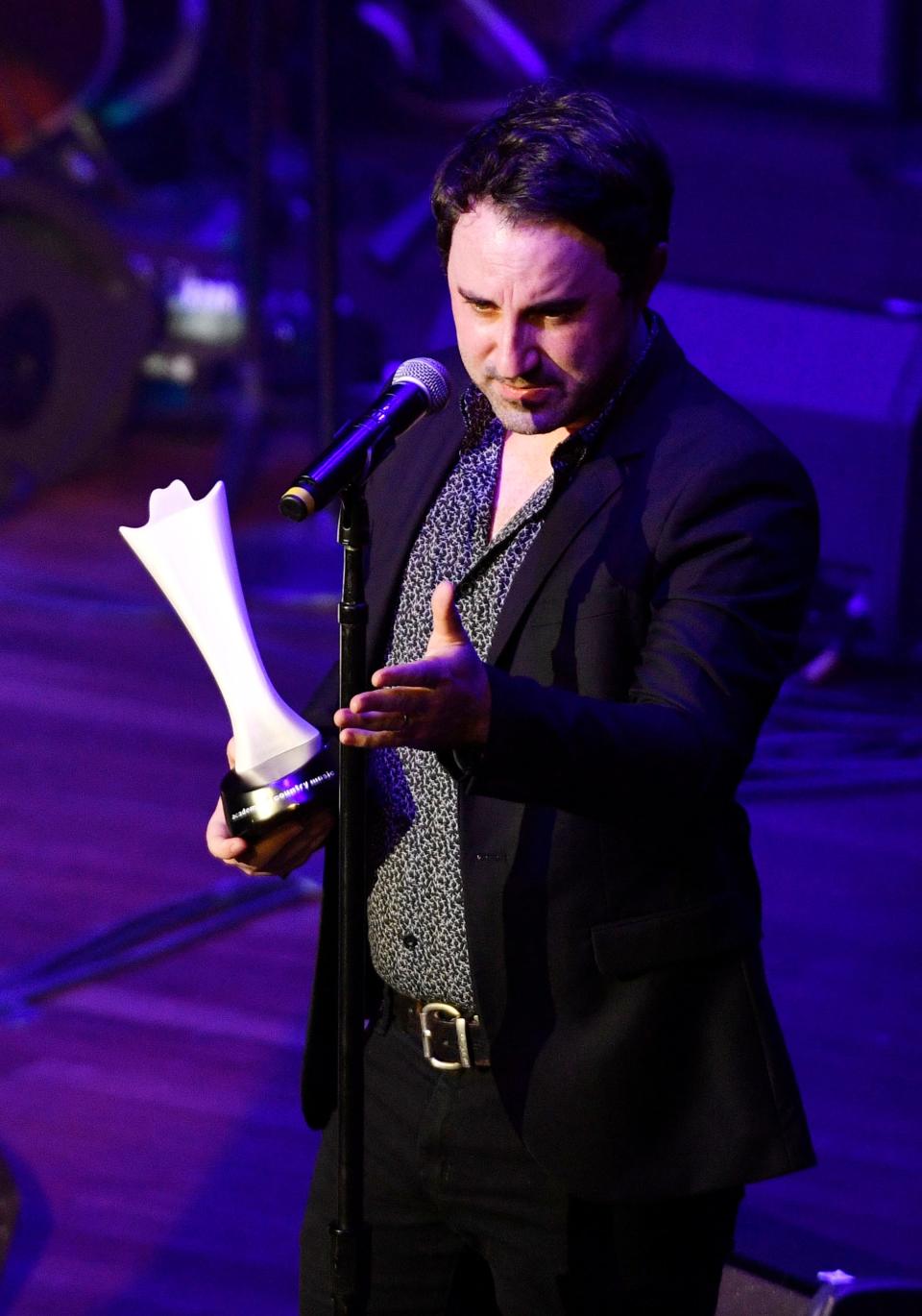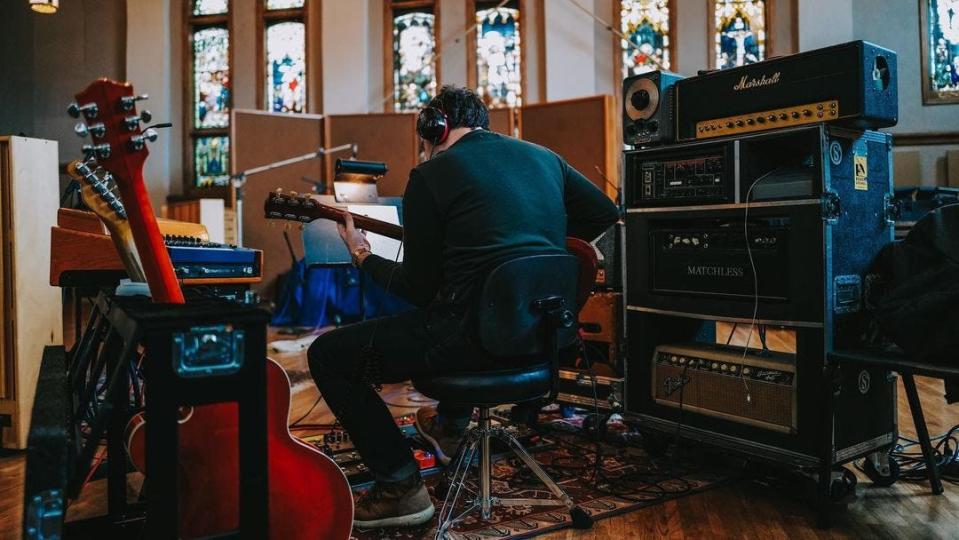Derek Wells discusses playing on 100 No. 1 country hits and reminisces on expansive career
- Oops!Something went wrong.Please try again later.
- Oops!Something went wrong.Please try again later.
- Oops!Something went wrong.Please try again later.
Nashville native Derek Wells has been referred to as "one of the most talented people in music – period" and "a magnet for great people and great music" by Frank Rogers, his boss at Nashville's Spirit Music Group.
As an A&R and production talent, he's renowned. As a session guitarist, he's equally successful. Recently – via Kane Brown's "Like I Love Country Music" – Wells marked the achievement of playing on 100 No. 1 singles on country radio.
He's a Grammy-nominated creator who has been named the Academy of Country Music’s Guitar Player of the Year and Country Music Association's Musician of the Year in the past decade.
However, in noting that he's done so after playing with Brown, Kenny Chesney, Florida Georgia Line, Kid Rock, Maddie and Tae, Maren Morris, Midland, Dolly Parton, Blake Shelton, Thomas Rhett, Carrie Underwood, and more, Wells has a great perspective on the depth and scope of sounds emanating of late from Music City.
Watch this: Shania Twain speaks with The Tennessean following the Academy of Country Music ACM Honors
More from Marcus Dowling: Kane Brown announces United States leg of international 'Drunk or Dreaming' Tour
The 39-year-old son of session musicians has seen his time in Nashville encompass everything from touring with Josh Turner to being the most in-demand artist in town. He offers a unique vantage point on the past, present and future.
Question: How do you break down the depth and scope of what your job entails of late?
Answer: Every day, a large percentage of my job is translating an artist's vision into sound. I'm not there to make my record; I'm there to make their record. So, whether I'm playing guitar, producing, or both, at the end of the day, I'm just trying to make their vision real. I play a song demo in a perfect world, and it inspires me. Then, I use my mental catalog of music and influences to come up with some parts that serve to aid the demo I've just heard. Then, the artist enjoys what my instincts have inspired.
But sometimes I have to play "the reference game," where an artist will say "remember that Chicks song? Maybe if you lean more towards that?" Even more, sometimes it's a production or mixing thing, and we decide to push the acoustic instruments to the forefront of a track.
Even deeper, some days, you don't make the song happen. And that's acceptable, too. You don't have to be able to fix your own engine to know that something is wrong with your car.

Question: There have to be times in such a tedious process that are difficult and make you want to leave the studio grind behind?
Answer: I rarely play music that makes me miserable. Nine times out of 10, I can sit with an artist and figure out what works best. We talk about our issues with an arrangement, and then it usually clicks. I'm a collaborator in getting this (metaphorical) ball across the goal line. That's my job.
Question: You've spoken in the past about your influences and how diverse they are – and how that impacts the present and future of how country music has and will continue to evolve. Thoughts?
Answer: As a teenager, I wasn't expressly a country music fan. However, the pop radio of my youth had everything from Jay-Z and Sheryl Crow to Incubus, all on the same radio station. This created a unique sonic library in my brain. Similarly, an artist like Kane Brown – like many – grew up listening to everything from Alan Jackson and Charlie Daniels Band to Jay-Z's "Blueprint" album, Limp Bizkit, Puddle of Mudd, whatever.
If you're listening to solely country radio, you have one particular view of the genre. However, if you're streaming it through DSPs, you are – for the first time in a long time – being served major label (released) songs, independent releases, and artists many people have never heard before. So, yes, the "country music" space is larger than ever.
Question: Whether it's Kane Brown staying fully rooted in country music while making seemingly every other type of music or HARDY going "all in" on early 2000s rock influences, country's doing a "this AND that" thing again that is really fascinating. You've played with both the people I named – and more. Am I right in highlighting this?
Answer: More artists these days are willing to commit to "going there" with their sound – not a foot or toe in the metaphorical pool, but jumping all of the way into the water. In "Like I Love Country Music," Kane Brown was adamant about fiddles being on the track. In fact, throughout his career, Kane's always expressed his love for having authentic to traditional country fiddles in his songs.
Question: I want to take you back to 2015 when you first started getting more significant recognition while working with artists like Maren Morris ("My Church," "80s Mercedes") and Maddie and Tae (“Girl in a Country Song”). What about those artists musically stood out?
Answer: Ah, yes. Maren's another artist with a diverse upbringing that gave her no pure allegiances to any one genre. She's so musically deep that she can quote you as many Dixie Chicks and George Strait songs as she can Rufus and Chaka Khan (classics). On her debut album, "HERO," we went from the very rootsy, soulful sound of "My Church" – with acoustic instrumentation and unquestionably country lyrics – to "80s Mercedes," which isn't that. The common thread on those songs, though? Maren – her artistry, voice, and perspectives on the world.
Maddie and Tae are different sides of the same coin. They're Oklahoma girls with a traditionally "Southern" and "country" upbringing, but they're not one-dimensional by any means. Their (2020-released) single "Die from a Broken Heart" is a country-sounding record, but then they'll do sassier records, some rock and soul, too. I remember we sat down to do 2020's "We Love Christmas" album, and the first thing they wanted to record was a cover of Donny Hathaway's "This Christmas" – you don't have those influences by being totally (consumed) in one genre.
Question: If asked what could make an artist's creative time with you in the studio easier these days, how would you respond?
Answer: More artists should be committed to showcasing as many sides of their personalities on their projects as possible. Also, they must be comfortable having honest conversations about their music and ideas. The conversation breaking down to something like simply whether or not I play more or fewer notes isn't a problem. These days I'm most concerned about getting right down to the issue of how people feel about how I interpret their music. Are they happy or unhappy with my work? Also, what, if anything, do I need to change to execute their vision?
In other news: Nashville-based payment platform Mozaic on the path to raising $5.5 million
More: Songwriters and streaming services avoid court battle with new royalties deal
Question: Country music feels like it's ramping up to an unprecedented surge. In the midst of this, what heartens you the most about life on Music Row these days?
Answer: There are so many great hit songs out there right now that I had absolutely no part in making. I love that. Human nature says that we go back to wells that have served us well. I have played on 100 No. 1 songs because people know that certain personnel (have a history of creating results). But I'm excited to see people thinking about not just recording their music in different ways and with different influences, but with a wider array of musicians, too. The making of music and the music industry in general only stands to prosper if this keeps happening.

This article originally appeared on Nashville Tennessean: Derek Wells discusses playing on 100 No. 1 hits in an expansive career

